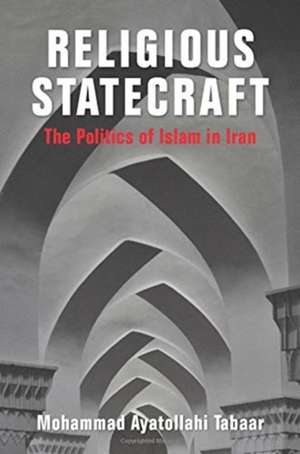Religious Statecraft – The Politics of Islam in Iran: Columbia Studies in Middle East Politics
Autor Mohammad Ayatol Tabaaren Limba Engleză Paperback – 14 noi 2019
Preț: 189.86 lei
Nou
Puncte Express: 285
Preț estimativ în valută:
36.33€ • 37.93$ • 29.100£
36.33€ • 37.93$ • 29.100£
Carte disponibilă
Livrare economică 26 martie-09 aprilie
Livrare express 11-15 martie pentru 34.89 lei
Preluare comenzi: 021 569.72.76
Specificații
ISBN-13: 9780231183673
ISBN-10: 0231183674
Pagini: 392
Dimensiuni: 153 x 228 x 24 mm
Greutate: 0.57 kg
Editura: Columbia University Press
Seria Columbia Studies in Middle East Politics
ISBN-10: 0231183674
Pagini: 392
Dimensiuni: 153 x 228 x 24 mm
Greutate: 0.57 kg
Editura: Columbia University Press
Seria Columbia Studies in Middle East Politics
Notă biografică
Mohammad Ayatollahi Tabaar is an assistant professor at the Bush School of Government and Public Service at Texas A&M University and a fellow at the Baker Institute for Public Policy at Rice University.
Cuprins
Preface
Introduction: The Politics of Islam
1. The Factional Causes and Religious Consequences of Politics
2. A Shi¿a Theory of the State
3. The ¿Islamic¿ Revolution
4. Institutionalizing Velayat-e Faqih
5. The Hostage Crisis: The Untold Account of the Communist Threat
6. Religion and Elite Competition in the Iran¿Iraq War
7. The Metamorphosis of Islamism After the War
8. The Factional Battle Over Khomeini¿s Velayat-e Faqih
9. Media, Religion, and the Green Movement
10. Historical Revisionism and Regional Threats
11. The Domestic Sources of Nuclear Politics
Conclusion
Notes
Index
Introduction: The Politics of Islam
1. The Factional Causes and Religious Consequences of Politics
2. A Shi¿a Theory of the State
3. The ¿Islamic¿ Revolution
4. Institutionalizing Velayat-e Faqih
5. The Hostage Crisis: The Untold Account of the Communist Threat
6. Religion and Elite Competition in the Iran¿Iraq War
7. The Metamorphosis of Islamism After the War
8. The Factional Battle Over Khomeini¿s Velayat-e Faqih
9. Media, Religion, and the Green Movement
10. Historical Revisionism and Regional Threats
11. The Domestic Sources of Nuclear Politics
Conclusion
Notes
Index















